Focus
Rush to learn English fuels quality issues
By He Na (China Daily)
Updated: 2010-08-05 14:45
 |
Large Medium Small |

Li Yang (left), founder of the Crazy English learning course, taught students and their parents English-learning methods in Dongguan, Guangdong province, on Jan 3 last year. Chen Fan / for China Daily |
Many Chinese students are eager to learn English, but schools and institutes are part of an unregulated market. He Na reports from Beijing.
"Extravagant" is the adjective that most people used after learning that Yao Wanchen, 27, spent 42,000 yuan ($6,200) on a one-and-a-half year English training program just to improve her English.
But Yao does not think so, and neither do countless trainees in many English-training schools and institutes around China.
"I think greatly improving my English is well worth the investment. I am in charge of foreign trade for our company and most of my customers are foreigners. Excellent English is very necessary for me," said Yao, an employee from the international trade branch of the China Animal Husbandry Group.
Like Yao, many people in China, from 4-year-olds to senior citizens, are enthusiastic to study English.
That enthusiasm also promotes the development of English-related industries, such as English bookstores, books, videos and magazines. Many English-training schools and institutes have sprung up as well.

China Education Daily recently reported that as of July, more than 400 million Chinese are studying English, accounting for about one-third of China's population. Experts predict that in just a few years, the number of English-speaking Chinese will outnumber the populations of all English-speaking countries in the world, combined.
Many Chinese people speak a few English words while talking with others. Some young people do that deliberately to show they are fashionable and modern.
Experts say the reason Chinese people are attracted to English isn't because of the language itself, but for its huge communication role worldwide.
Universal language
English is the official language of 63 countries in the world. Every day more than one-third of the world's population is communicating in English. In addition, more than 80 percent of the technological information is written in English, and almost 100 percent of the software source codes are written in English. The majority of the world's publications and world-class scientific papers are published and written in English.
"More and more importance has been given to English after China carried out the policy of reform and opening up to the outside world in the late 1970s. And accompanying China's rise on the world stage in recent years are growing connections of commerce and culture with other countries, especially those developed English-speaking countries, all of which provides many opportunities for the people who have grasped English well," said Xiao Yan, national public relations director of Wall Street English, a well-known English training institute in China that has taught more than 150,000 people and established 43 training schools in China during the past 10 years.
"The entire Chinese society attaches high importance to the English study as sometimes it even plays a vital role for a person who plans to pursue further education and seek a better career. There is no doubt that people who have a good command of English are more competitive than their peers and can win more developing opportunities," she added.
300 yuan per day
Li Yu, a 14-year-old Beijing girl who is a second-year middle school student, joined an English training course this summer vacation. She sits through a three-hour English class every morning taught by a Chinese teacher and then a three-hour extra course taught by a foreigner who is a native English speaker.
Just for the six-hour course in English, her parents have to pay at least 300 yuan each day, but her parents said as long as their daughter can make some progress in English and can have a safe summer vacation, the money has been well spent.
China's training market has an estimated market value of 300 billion yuan ($44 billion) in 2010. Of that total, the English-training market is estimated to reach 30 billion yuan, according to sources from the National Education Development Statistical Bulletin.
"Just like a big tempting cake, the prospect of the English-training market never escaped the sharp eyes of investors, and many people have shown a great interest in it. New English-training institutes are registered almost every day, while others are going bankrupt. The market witnessed a sharp increase especially when China was applying to join the World Trade Organization and preparing to host the 2008 Beijing Olympic Games," said Xiao.
However, up to now no official data has been released on the overall number of English-training institutes and schools in China.
The market is mainly made up of four types of English-training schools and institutes: those affiliated with universities, foreign-invested training institutes, domestic well-known private training organizations, and countless small and medium-sized private training schools.
The advertisements for English-training schools and institutes can be found almost everywhere and the classrooms of these training schools are never short of students. However, even though the market is prosperous, it still has many inevitable problems.
"The industry is in urgent need of establishing a credit-rating system, which would mandate the essential requirements that an English-training institute must have, such as the education background of foreign teachers, Chinese teachers, work staff and teaching hardware," Xiao said.
"Raising the industry entry threshold is one of the best ways to standardize the English-training market and guarantee consumers' rights," Xiao said.
A student who learns incorrect English - for example, bad accents or wrong grammar - suffers a devastating disadvantage, said John Gordon, vice president of New Channel International English Group. This student will have to unlearn the bad lessons, and then grasp the correct lessons and rebuild his confidence in English, he said.
"Of course, the more English-training institutes in existence, the more choices the students and trainees have. But the key point is the choice needs to be based on qualified service, or else, they will not only waste money, but also precious time," Gordon said.
The credit-rating system should be enforced by authorities in all the English-training institutes and schools and the ratings can be the criteria for consumers' choices, he added.
Many private English-training schools and institutes require the tuition fee to be collected first, before the classes are taught. This means that students often pay several thousand yuan or even more than 10,000 yuan before the classes begin. In some cases, the schools went bankrupt and closed their doors after taking many students' money, causing outrage and demands for government intervention.
No refunds
Such was the case with two institutes in 2009: Real Life English and Linguaphone English. Following the closing of these training schools, many trainees felt cheated and had to abandon their studies, and many of them did not get their tuition fees back.
"The entire English-training market still lacks an improved supervision and guarantee system. English-training institutes and schools should deposit 20 percent or 30 percent of the tuition fee that is received in advance to a certain account that the government assigns as a security deposit. Therefore, if an institute goes bankrupt, trainees can still get some of their fees returned," said Xu Wei, president of New World Education Group.
Setting up a strict supervision mechanism and self-discipline within the industry are the keys to healthy development of the English-training market, he added.
The development of the English-training industry also has drawn the attention of the Ministry of Education. According to Ji Mingming, vice president of the Chinese Association for Non-government Education, the Ministry of Education along with some experts are thrashing out the national standard for English education and training.
An education and training services national standards committee is still working on the regulations. The committee will assess various institutions and release the ratings to the public regularly, which will help protect consumer interests, he added.
"Though English plays a more and more important role in modern society, the study of English should follow the law of language. We have to admit that some of the private English-training schools are pretty good in working out new effective ways of teaching English, but still people need to discover their own learning style," Han Baocheng, a professor from the National Research Center for Foreign Language Education.
"Do not trust the ads too much, because what is suitable for others may not work for you," Han said.

Various advertisements of English-training courses are posted on many streets in Beijing and other big cities across the country. More and more Chinese are eager to learn English to further their careers. Nan Shan / for China Daily |
|
 A foreign volunteer gives an English training course in Shenyang, capital of Liaoning province, during the 2008 Beijing Olympic Games. Li Tong / for China Daily |

Staff members of the Shanghai Expo play an English learning game with their English teachers. Wang Juliang / for China Daily |
|
 Young professionals in Shanghai learn English at EF, a popular English-training institute. Jun Ying / for China Daily |

